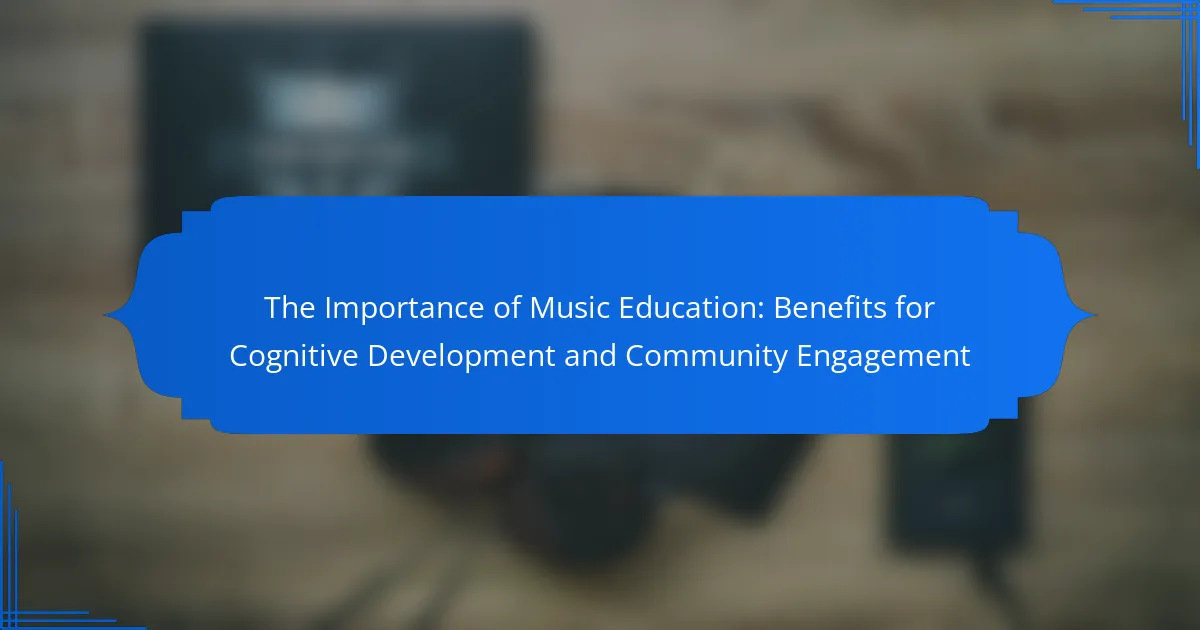Music education is a critical component of cognitive development and community engagement, offering numerous benefits to students. It enhances essential skills such as memory, attention, critical thinking, and problem-solving, leading to higher academic performance. Furthermore, music education promotes social skills through collaboration in group settings and strengthens community ties through shared musical experiences. Effective implementation of music education in schools requires structured curricula, trained educators, and community involvement to maximize its impact on students’ holistic development. Overall, music education plays a vital role in fostering both individual growth and community cohesion.
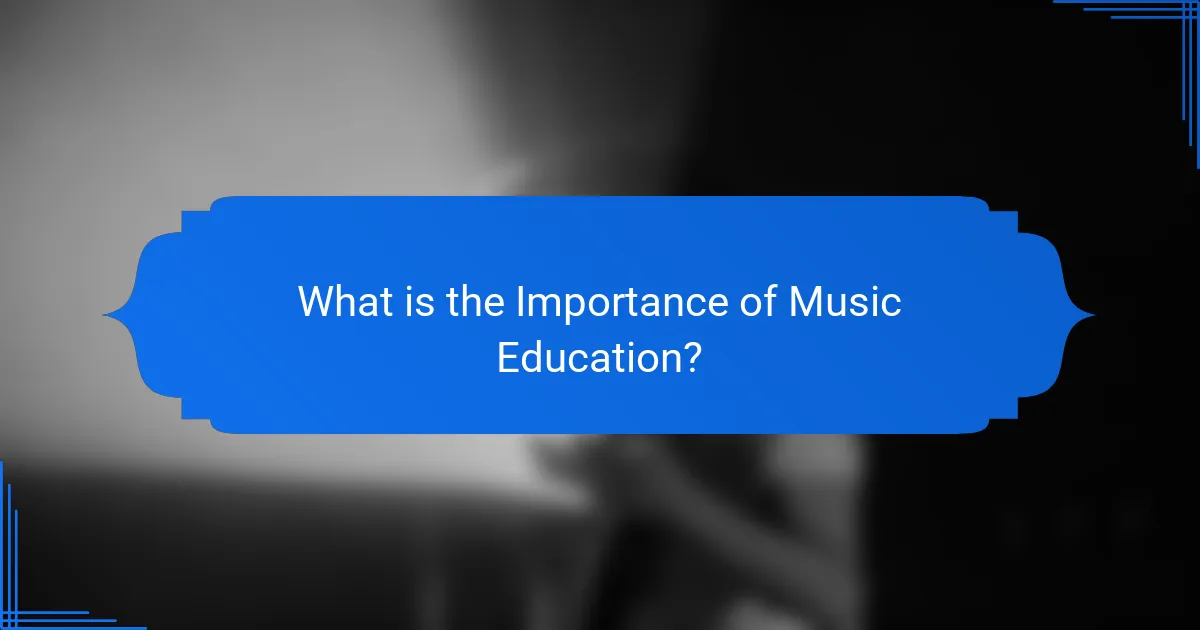
What is the Importance of Music Education?
Music education is important for cognitive development and community engagement. It enhances critical thinking and problem-solving skills in students. Studies show that music education improves memory and attention span. For example, research from the University of California found that students involved in music programs scored higher on standardized tests. Music education also fosters social skills and teamwork. Participating in group performances builds collaboration and communication abilities. Furthermore, it strengthens community ties through shared musical experiences. Overall, music education plays a vital role in holistic development and community cohesion.
How does music education contribute to cognitive development?
Music education significantly contributes to cognitive development. It enhances skills such as memory, attention, and problem-solving. Learning music engages various brain areas, promoting neural connectivity. Studies show that children involved in music education score higher on standardized tests. For instance, a study by the University of California found that music students scored an average of 20% higher in math and reading. Additionally, music education fosters discipline and perseverance, essential for academic success. Overall, music education provides a multifaceted approach to enhancing cognitive abilities.
What specific cognitive skills are enhanced by music education?
Music education enhances several specific cognitive skills. These skills include memory, attention, and spatial-temporal reasoning. Studies show that music training improves verbal memory and literacy skills. For instance, a study by Ho et al. (2003) found that children with music training had better verbal memory than those without. Additionally, music education fosters attention skills, helping students focus better on tasks. Research by Moreno et al. (2011) demonstrated that music training enhances attention control. Furthermore, spatial-temporal reasoning is improved through music education. This skill is crucial for mathematics and problem-solving. A study by Rauscher et al. (1997) indicated that music training leads to enhanced spatial-temporal skills. Overall, music education significantly boosts cognitive abilities that are essential for academic success.
How does music education influence memory and learning processes?
Music education enhances memory and learning processes significantly. Engaging in music education improves cognitive skills such as memory retention and recall. Studies show that music training strengthens neural connections in the brain. This leads to better information processing and retention. Research by Schellenberg (2004) found that children involved in music lessons scored higher on IQ tests than those who did not participate. Additionally, learning an instrument requires discipline and practice, which fosters a strong work ethic. This discipline translates to improved academic performance in other subjects. Overall, music education serves as a powerful tool for enhancing cognitive abilities and memory in learners.
Why is community engagement a key aspect of music education?
Community engagement is a key aspect of music education because it fosters collaboration and social skills among students. Engaging with the community allows students to connect their learning with real-world experiences. This connection enhances their understanding of music’s cultural significance. Participation in community events also provides performance opportunities, boosting students’ confidence. Research indicates that students involved in community music programs show improved academic performance. Furthermore, community engagement promotes inclusivity and diversity in music education. It encourages students to appreciate different musical traditions and perspectives. Overall, community engagement enriches the music education experience and contributes to holistic development.
How does music education foster social connections within communities?
Music education fosters social connections within communities by creating collaborative environments. Participants engage in group activities such as ensembles and choirs. These activities encourage teamwork and communication among individuals. Music education also promotes cultural exchange and understanding through diverse musical traditions. Research shows that students involved in music programs report stronger friendships. According to a study by the National Association for Music Education, 75% of students believe music education helps them connect with peers. Additionally, community concerts and events provide platforms for social interaction. Ultimately, music education strengthens community bonds and enhances social cohesion.
What role does music education play in cultural preservation and diversity?
Music education plays a crucial role in cultural preservation and diversity. It helps pass down traditional music forms and practices from one generation to the next. This transmission maintains cultural identities within communities. Music education also encourages the appreciation of diverse musical styles. Exposure to various genres fosters understanding and respect among different cultures. Studies show that music education enhances social cohesion by bringing together diverse groups. For example, community music programs often involve participants from various backgrounds. This interaction promotes inclusivity and collaboration. Ultimately, music education serves as a vital tool for sustaining cultural heritage and fostering diversity.
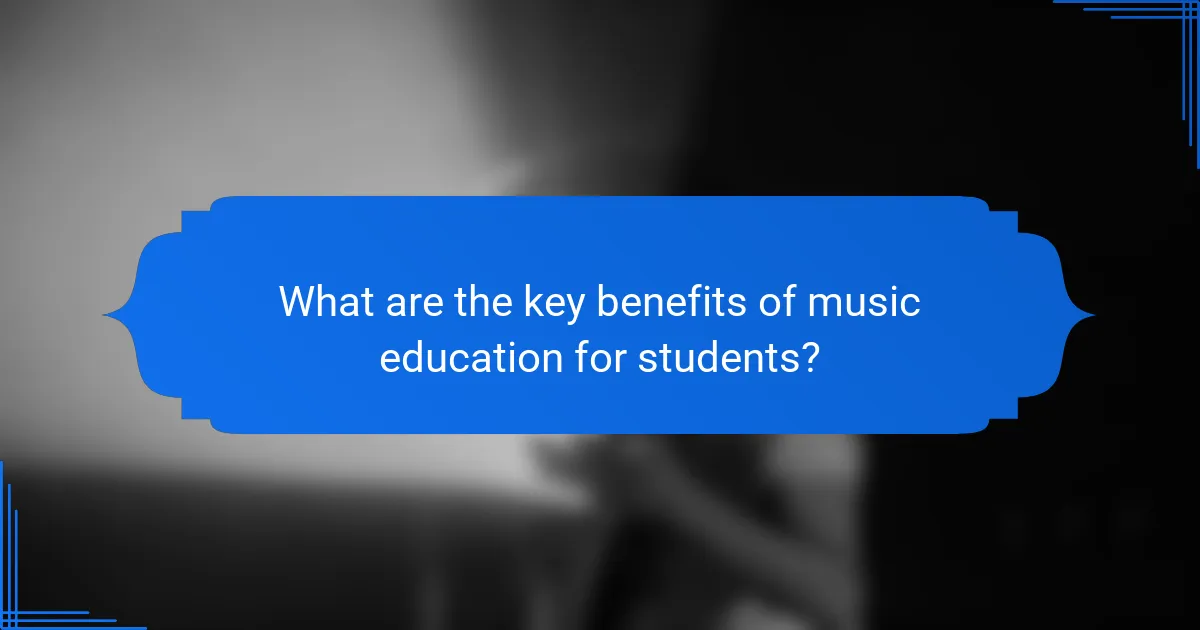
What are the key benefits of music education for students?
Music education provides numerous benefits for students. It enhances cognitive skills such as memory and attention. Studies show that music training improves verbal skills and mathematical understanding. Music education also fosters social skills through collaboration in group settings. Students involved in music tend to have higher academic performance overall. Research indicates that music students often demonstrate increased emotional intelligence. Furthermore, music education encourages discipline and perseverance through practice. These benefits collectively contribute to a well-rounded education for students.
How does music education improve academic performance?
Music education improves academic performance by enhancing cognitive skills. Studies show that students involved in music education perform better in subjects like math and reading. This improvement is linked to the development of skills such as memory, attention, and spatial-temporal skills. Research published in the Journal of Educational Psychology indicates that music training boosts verbal memory and literacy skills. Additionally, a study by the University of California found that music students scored higher on standardized tests compared to their peers. Engaging with music fosters discipline and perseverance, traits beneficial for academic success. Overall, music education provides a multifaceted approach to learning that positively impacts academic achievement.
What evidence supports the link between music education and higher grades?
Research indicates a positive correlation between music education and higher academic performance. Studies show that students engaged in music education often achieve better grades than their peers. For instance, a 2013 study by the University of Kansas found that students who participated in music classes scored higher on standardized tests in math and reading. This study analyzed data from over 25,000 students and highlighted that music education fosters skills such as discipline and creativity, which enhance overall learning. Additionally, a report from the Arts Education Partnership states that music education improves cognitive abilities, leading to better academic outcomes. Thus, substantial evidence supports the notion that music education contributes to higher grades.
How does participation in music education affect standardized test scores?
Participation in music education positively affects standardized test scores. Studies indicate that students involved in music programs often score higher in subjects like math and reading. For instance, research from the University of California found that students engaged in music education scored an average of 20% higher on standardized tests compared to their peers without music training. This correlation may arise from enhanced cognitive skills developed through music, such as improved memory and attention. Furthermore, music education fosters discipline and teamwork, which can contribute to better academic performance. Overall, the evidence suggests that music education plays a significant role in enhancing students’ academic achievements.
What emotional and psychological benefits does music education provide?
Music education provides significant emotional and psychological benefits. It enhances self-esteem and confidence through performance and mastery of skills. Students often experience reduced anxiety and stress levels when engaging with music. Additionally, music education fosters emotional expression and creativity. Research indicates that children involved in music education show improved emotional regulation. They also develop better social skills through collaboration in group settings. A study by the University of Vermont found that music education correlates with higher levels of empathy among students. Overall, music education positively impacts mental health and emotional well-being.
How does music education contribute to self-esteem and confidence?
Music education significantly enhances self-esteem and confidence. Engaging in music allows individuals to express themselves creatively. This expression fosters a sense of achievement when mastering an instrument or a piece of music. Research shows that students involved in music programs often report higher self-esteem levels. For instance, a study by the University of California found that music education correlates with increased self-worth among adolescents. Additionally, performing in front of an audience builds public speaking skills and reduces performance anxiety. This exposure helps individuals feel more comfortable in social situations. Overall, music education serves as a powerful tool for personal development.
What impact does music education have on stress relief and emotional well-being?
Music education has a significant positive impact on stress relief and emotional well-being. Engaging in music education allows individuals to express emotions creatively. This expression can lead to reduced anxiety and improved mood. Studies show that music participation correlates with lower stress levels. For example, a study published in the Journal of Music Therapy found that music therapy significantly reduced anxiety in participants. Additionally, music education fosters social connections, which enhance emotional support. These connections contribute to a sense of belonging and improved mental health. Overall, music education serves as an effective tool for promoting emotional well-being and alleviating stress.
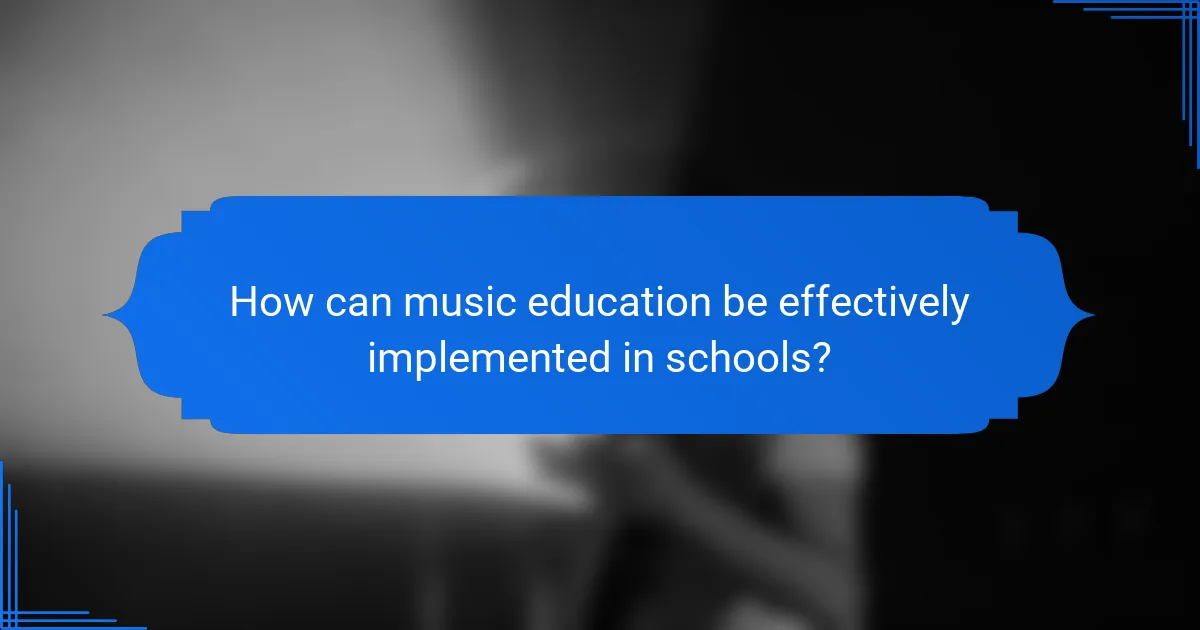
How can music education be effectively implemented in schools?
Music education can be effectively implemented in schools through a structured curriculum and adequate resources. Schools should provide trained music educators to deliver quality instruction. Incorporating diverse music genres can engage students with varying interests. Regular performances can enhance student motivation and community involvement. Collaboration with local musicians can enrich the program and provide real-world experiences. Research shows that music education improves cognitive skills and social development. For example, a study by the Arts Education Partnership found that students involved in music programs score higher on standardized tests. Thus, effective implementation requires commitment from school administrations, educators, and the community.
What teaching methods are most effective for music education?
Active learning methods are the most effective for music education. These methods engage students through hands-on experiences. Techniques like ensemble playing and improvisation foster collaboration. Research shows that active participation enhances retention and understanding. For instance, a study by the National Association for Music Education found that students in active learning environments score higher on assessments. Additionally, technology integration, such as using music software, supports individualized learning. Peer teaching also proves beneficial, as it encourages students to articulate their understanding. Overall, these methods create a dynamic and effective learning atmosphere in music education.
How do hands-on experiences enhance music learning?
Hands-on experiences enhance music learning by providing active engagement with musical concepts. This approach allows learners to practice skills in real-time. It fosters a deeper understanding of rhythm, melody, and harmony. Research indicates that active participation can improve memory retention. According to a study by Hanna-Pladdy and Mackay (2011), musicians exhibit enhanced cognitive abilities. These abilities are linked to their hands-on practice and performance experiences. Additionally, hands-on learning encourages collaboration among students. This collaboration can lead to improved social skills and community connections. Overall, hands-on experiences create a richer, more effective music education environment.
What role do technology and digital tools play in music education?
Technology and digital tools play a significant role in music education by enhancing learning experiences. These tools facilitate access to a wide range of musical resources. Students can use software for composition and recording. Digital platforms allow for collaboration among musicians worldwide. Online tutorials and courses provide flexible learning options. Interactive apps engage students in music theory and practice. Research shows that technology improves student motivation and engagement in music. A study by the National Association for Music Education found that technology integration leads to better retention of musical concepts.
What are the challenges faced in promoting music education?
Promoting music education faces several significant challenges. Funding limitations often hinder the establishment and maintenance of music programs. Many schools prioritize core subjects, leading to reduced resources for music education. Additionally, lack of trained music educators can compromise program quality. Community awareness about the benefits of music education is often low. This leads to insufficient support from parents and local organizations. Furthermore, standardized testing pressures may devalue arts education in school curriculums. These challenges collectively undermine the effectiveness and reach of music education initiatives.
How can budget constraints affect music programs in schools?
Budget constraints can significantly impact music programs in schools. They often lead to reduced funding for instruments and materials. Limited resources can result in fewer music classes being offered. Schools may have to cut back on extracurricular music activities. This can diminish students’ opportunities to participate in performances. Budget cuts may also affect the hiring of qualified music teachers. Consequently, the quality of music education can decline. Research shows that schools with strong music programs enhance student engagement and academic performance.
What strategies can be employed to overcome barriers to music education?
Implementing community partnerships can help overcome barriers to music education. Schools can collaborate with local music organizations. This partnership can provide resources and expertise. Offering scholarships for music programs can also reduce financial barriers. Schools can seek funding from grants and donations. Providing free or low-cost instruments can make music education accessible. Training teachers in diverse teaching methods can enhance engagement. Creating after-school music programs can reach students who need extra support.
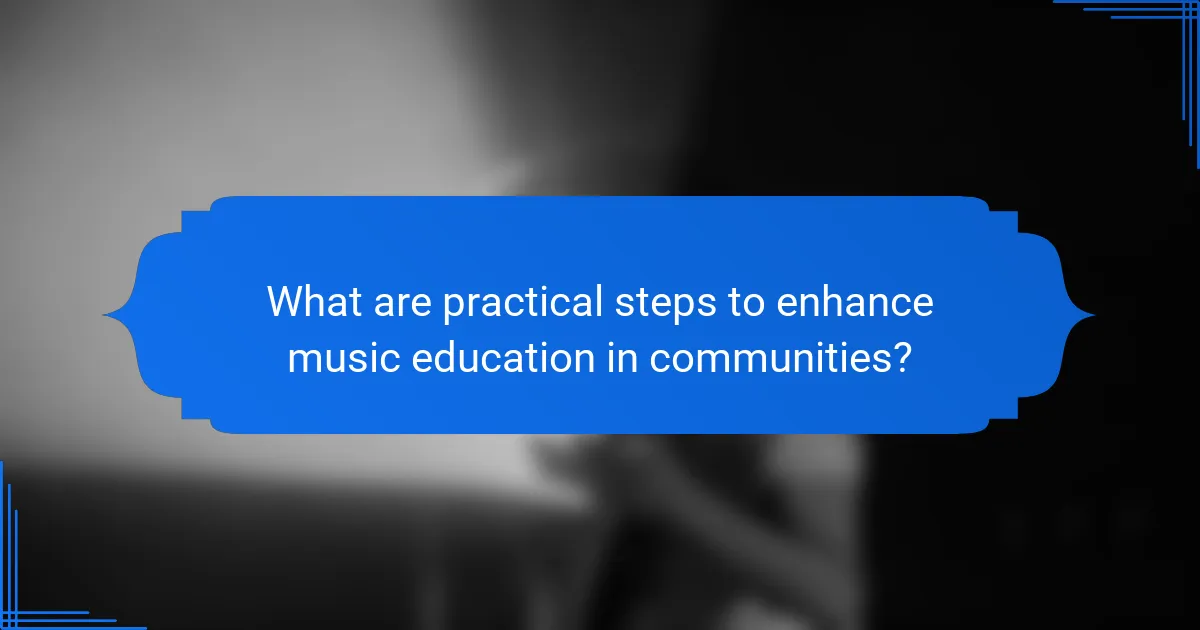
What are practical steps to enhance music education in communities?
To enhance music education in communities, implement accessible programs and resources. Establish partnerships with local schools and organizations to offer music classes. Provide instruments and materials through community grants or donations. Train local educators in effective music teaching methods. Organize community events that showcase student performances. Encourage parental involvement in music activities. Create mentorship programs connecting students with local musicians. Assess the impact of music education on student engagement and cognitive development through surveys and studies.
How can community involvement support music education initiatives?
Community involvement can significantly support music education initiatives by providing resources, funding, and volunteer support. Local businesses and organizations often contribute financial support for music programs. This funding can enhance the quality of music education through better instruments and facilities.
Additionally, community members can volunteer their time and expertise. Musicians and educators from the community can offer workshops and mentorship. This hands-on involvement enriches the learning experience for students.
Research shows that schools with strong community ties often see improved student engagement and academic performance. For instance, a study by the National Endowment for the Arts found that community-supported arts programs can lead to higher student participation in music education.
Community events can also raise awareness and appreciation for music education. Concerts and performances showcase student talent and foster community pride. This visibility can attract more support and interest in music programs.
Overall, community involvement creates a supportive ecosystem that enhances music education initiatives.
What partnerships can be formed to strengthen music education programs?
Partnerships with local music organizations can strengthen music education programs. Collaborating with community orchestras provides students with performance opportunities. Schools can partner with music retailers for instrument donations and discounts. Connecting with universities allows access to music educators and student mentors. Nonprofits focused on arts education can offer grants and resources. Partnerships with local businesses can sponsor music events and fund programs. Engaging parents and community members in support initiatives fosters a collaborative environment. Research shows that such partnerships enhance student engagement and improve educational outcomes in music education.
How can local events promote music education awareness?
Local events can effectively promote music education awareness by providing community engagement opportunities. These events can showcase local musicians and educators, highlighting the importance of music in education. Workshops and demonstrations at these events can offer hands-on experiences for attendees. This interactive approach fosters interest in music education among families and children.
Statistics show that communities with active music programs report higher student engagement in schools. Events can also feature discussions on the cognitive benefits of music education, backed by research from the National Association for Music Education. By collaborating with schools, local events can create a supportive network for music education initiatives. This collaboration can lead to increased funding and resources for music programs in schools.
What best practices can educators adopt for effective music teaching?
Effective music teaching can be achieved through several best practices. Educators should incorporate diverse teaching methods to cater to various learning styles. Active participation is crucial; students learn best when they engage in hands-on activities. Setting clear goals helps students understand what they are working towards. Regular feedback allows students to improve and stay motivated. Creating a supportive environment fosters creativity and confidence. Integrating technology can enhance learning experiences and provide new tools for practice. Collaboration with other educators can enrich the curriculum and expand students’ musical exposure. Research shows that these practices lead to improved student outcomes in music education.
How can educators adapt music curriculum to meet diverse student needs?
Educators can adapt music curriculum to meet diverse student needs by incorporating differentiated instruction strategies. This approach allows teachers to tailor lessons based on students’ varying abilities and learning styles. For instance, they can provide visual aids for visual learners and hands-on activities for kinesthetic learners. Additionally, offering a variety of musical genres can engage students with different cultural backgrounds.
Incorporating technology, such as music software or apps, can also support diverse learning preferences. Educators can use collaborative projects to foster peer learning, allowing students to learn from one another. Furthermore, regular assessments can help educators identify individual student needs and adjust the curriculum accordingly. Research shows that differentiated instruction improves student engagement and achievement in music education.
What resources are available for teachers to enhance their music education programs?
Teachers can access various resources to enhance their music education programs. These include online platforms offering lesson plans and curriculum guides. Websites like Music Educators National Conference provide valuable educational materials. Additionally, local music stores often supply instruments and instructional books. Professional development workshops can improve teaching skills and knowledge. Grants and funding opportunities are available to support music programs in schools. Community partnerships can also provide resources and support for music initiatives. Research indicates that quality music education positively impacts cognitive development and community engagement.
The main entity of this article is music education, which is highlighted for its significant benefits to cognitive development and community engagement. The article discusses how music education enhances critical thinking, memory, attention, and social skills among students, leading to improved academic performance. It further explores the role of music education in fostering community ties, cultural preservation, and emotional well-being. Key findings from various studies are presented to support the positive impact of music education on both individual learners and the broader community.
